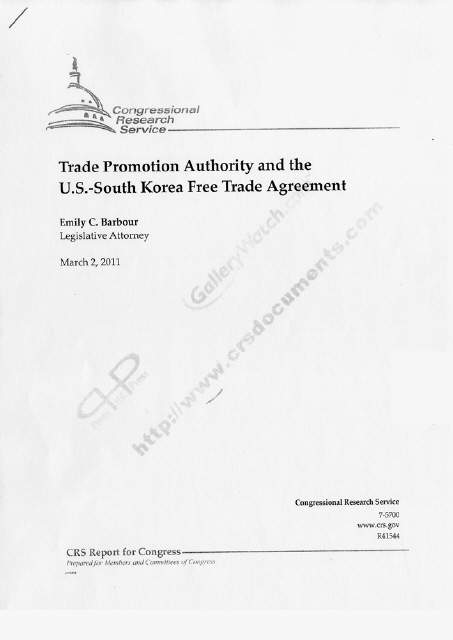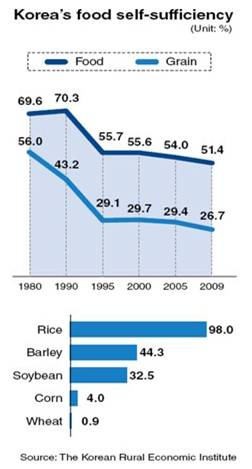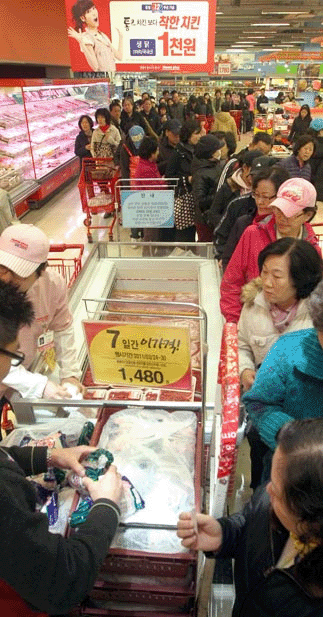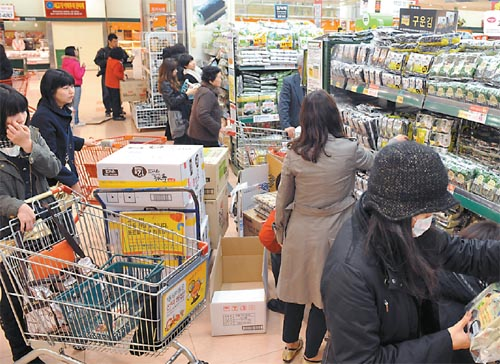
Market Information > 한국 농식품 시장뉴스
한국 농식품 시장뉴스
March 25, 2011
2011.03.25
http://english.yonhapnews.co.kr/business/2011/03/24/0502000000AEN20110324003200320.HTML
Summary:
S. Korean seaports' cargo handling jumps over 7 pct in Feb. [English, OYS]
http://english.yonhapnews.co.kr/news/2011/03/25/0200000000AEN20110325002300320.HTML
Full text: SEOUL, March 25 (Yonhap) -- The volume of cargo handled at South Korea's seaports jumped over 7 percent in February from a year earlier amid recovering economic conditions, the transportation ministry said Friday.
S. Korean consumer sentiment hits 23-month low in March [English, OYS]
http://english.yonhapnews.co.kr/news/2011/03/25/0200000000AEN20110325001000320.HTML
Full text:
The consumer sentiment index (CSI) -- a gauge of consumers' overall economic outlook, current living conditions and future spending -- came in at 98 for March, down from 105 in the previous month, the Bank of Korea (BOK) said in a monthly report.
Analysts say the
http://english.hani.co.kr/arti/english_edition/e_business/469689.html
Summary: It has been confirmed that the
With FMD over, new precautions unveiled by gov’t [English, CSY]
Officials admit they botched their responses after earliest outbreaks
http://joongangdaily.joins.com/article/view.asp?aid=2933937
Summary: Declaring that the nation’s worst foot-and-mouth outbreak was over, the government yesterday announced a new measure to tighten its oversight of the livestock industry, requiring farmers to apply for permits to operate cattle and pig farms starting next year. The government has lowered the alert level for the disease, Kim said, adding that authorities are now able to control the situation. Starting next year, only farmers who have proper facilities and who have completed education programs on epizootic preventive measures will be given permits to operate cattle and pig farms. The government said the permit system will be adopted for large-scale farmers, while small-scale farmers will need to register with their local authorities, detailing their farming of chickens, ducks, cattle and pigs. The government said more details on the permit system, including who will be considered large-scale farmers, will be determined by the end of next month. Under the new plan, the government will also hold farmers accountable for outbreaks after conducting probes on their fulfillment of prevention efforts. A new standard of compensation will also be used to take into account the outbreak time, period and scope of loss, rather than paying uniform compensation based on the number of culled animals.
http://english.yonhapnews.co.kr/business/2011/03/24/35/0501000000AEN20110324009500320F.HTML
Summary:
Analysts say the
http://english.hani.co.kr/arti/english_edition/e_business/469689.html
Full text: It has been confirmed that the
A report released on Mar. 3 by the U.S. Congressional Research Service, titled “U.S.-South Korea Beef Dispute: Issues and Status,” states that “Administration officials have stated that their objective is ‘to eventually secure full market access for U.S. beef’. . ..[but] the Administration may not require achieving this objective before the KORUS FTA is sent to Congress, and instead may seek to secure commitments from South Korea to move in steps toward that goal.”

The U.S. Congressional Research Service report entitled “U.S.-South Korea Beef Dispute: Issues and Status,” released Mar. 3.
ROKG releases plan for improving livestock industry and animal diseases control [Korean: BYK]
http://www.ajnews.co.kr/view.jsp?newsId=20110324000294
Summary: The Korean government announced its plan to improve the Korean livestock industry and control measures for animal diseases. The so-called ceiling of total number of animals to be raised at each province was dropped from this plan. Also, the large livestock farms will be able to conduct business on a permit basis. Livestock movement will be immediately restricted when a major diseases outbreak is detected, such as FMD.
http://www.koreaherald.com/business/Detail.jsp?newsMLId=20110324000671

5.
South Koreans to Give Rice to North Koreans Very Soon; US determined to give rice without regard to the North's apologies [English, CSY]
http://english.khan.co.kr/khan_art_view.html?artid=201103231300267&code=710100
Summary: South Koreans to Give Rice to North Koreans Very Soon; US determined to give rice without regard to North's apologies and expressions of intention to denuclearize. The South Korean government decided upon a policy of providing food to North Koreans regardless of their apologies for sinking the Cheonan battleship, the shelling of Yeongpyeongdo, and their expression of intentions to de-nuclearize, in case the US government determines to give food to the North after the announcement of the on-site survey about food situation in North Korea, which is to be made by the World Food Program (WFP), it was learned. This seems to be based on a judgement that the Lee government cannot oppose or sit idly to see
WFP officials to visit S. Korea amid report of dire food situation in
http://english.yonhapnews.co.kr/news/2011/03/25/0200000000AEN20110325004300315.HTML
Full text: SEOUL, March 25 (Yonhap) -- A team of U.N. food agency officials, including one who recently traveled to North Korea, will visit South Korea next week, a government source said Friday, amid signs that the international community may be moving to resume food aid to the communist state.
The trip by World Food Program (WFP) officials in charge of donor relations will begin on Monday and last through Thursday as they meet with foreign and unification ministry officials here, the source said, speaking on the condition of anonymity citing policy.
S. Korea to send food supplies to victims of
http://english.yonhapnews.co.kr/national/2011/03/24/69/0301000000AEN20110324011300315F.HTML
Full text:
Korean food shows potential to globalize in
http://english.yonhapnews.co.kr/news/2011/03/16/0200000000AEN20110316007000315.HTML
Full text:
These fairly aggressive marketing tactics are just two examples of efforts to globalize Korean cuisine and, by proxy, Korean culture. But can Korean food ever be a global hit in the same way that Japanese or Thai food is?
According to figures released by the Korean food service industry in 2008, there were just 50 Korean restaurants in
Spring chickens [English, OYS]
http://joongangdaily.joins.com/article/view.asp?aid=2933918

Unnecessary panic [English, OYS]
http://joongangdaily.joins.com/article/view.asp?aid=2933870

ROKG to release 150,000 MT of government held rice [Korean: BYK]
http://www.mifaff.go.kr/gonews/content_view.jsp?newsid=155440625§ion_id=b_sec_1
Summary: The government will release 150,000 MT of government held rice stocks to stabilize the rice market price. Among the 150,000 MT, it will first auction off 50,000 MT on March 31st and will determine later when to release the remainder of the stocks.
The information in this report was compiled by the Agricultural Trade Office (ATO) at the U.S. Embassy in Seoul, South Korea. The press summaries contained herein do NOT reflect USDA, the U.S. Embassy, or other U.S. government agency official policy or view point. U.S. food exporters can learn more about market opportunities in South Korea by reviewing ATO Seoul’s Exporter Guide and other reports available at www.fas.usda.gov by clicking on “attaché reports”.
Agricultural Trade Office, U.S. Embassy - Seoul
Tel: 82-2-6951-6848 Fax: 82-2-720-7921
Email: atoseoul@usda.gov